
-
Find the right food for your petTake this quiz to see which food may be the best for your furry friend.Find the right food for your petTake this quiz to see which food may be the best for your furry friend.Featured products
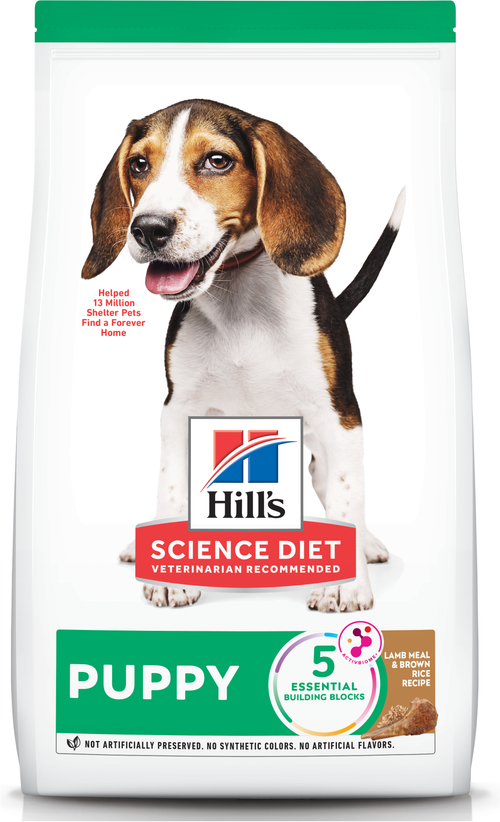 Puppy Lamb Meal & Brown Rice Recipe
Puppy Lamb Meal & Brown Rice RecipeVital nutrients to support 5 essential building blocks for lifelong health
Shop Now Puppy Large Breed Chicken & Brown Rice Recipe
Puppy Large Breed Chicken & Brown Rice RecipeVital nutrients to support 5 essential building blocks for lifelong health
Shop Now Hill's Science Diet Adult 7+ Senior Vitality Small & Mini Chicken & Rice Recipe Dog Food
Hill's Science Diet Adult 7+ Senior Vitality Small & Mini Chicken & Rice Recipe Dog FoodImproves everyday ability to get up & go
Shop NowFeatured products Adult Indoor Chicken Recipe Cat Food
Adult Indoor Chicken Recipe Cat FoodSupports energy level and beautiful fur in indoor cats
Shop Now Adult 7+ Chicken Recipe Cat Food
Adult 7+ Chicken Recipe Cat FoodSupports energy level and beautiful fur in mature cats
Shop Now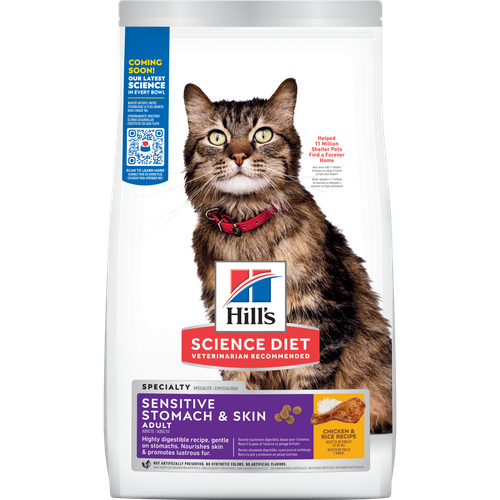 Adult Sensitive Stomach & Skin Cat Food
Adult Sensitive Stomach & Skin Cat FoodHighly digestible food that is gentle on the stomach. Nourishes skin & promotes lustrous fur.
Shop Now -
Dog
- Dog Tips & Articles
-
Health Category
- Weight
- Food & Environmental Sensitivities
- Urinary
- Digestive
- Joint
- Kidney
-
Life Stage
- Puppy Nutrition
- Adult Nutrition
Cat- Cat Tips & Articles
-
Health Category
- Weight
- Skin & Food Sensitivities
- Urinary
- Digestive
- Kidney
-
Life Stage
- Adult Nutrition
Featured articles Water
WaterDiscover why water is the most important nutrient for your dog or cat to live a healthy life. Find out how much water your pet should consume each day.
Read More The Incredible Science Behind Your Pet's Microbiome
The Incredible Science Behind Your Pet's MicrobiomeLearn what a pet's microbiome is, how it contributes to your pet's gut & overall health, and why nutrition is important in maintaining healthy microbiomes.
Read More Pet Food Storage Tips
Pet Food Storage TipsDiscover how and where to store your dry, as well as canned, dog and cat food. Learn how to find the "best before" dates on all Hill's pet food packaging.
Read More -


As a pet parent with an adopted dog, you might not know your dog's exact age. And now his hair, especially around his muzzle, is turning gray. Does a gray muzzle mean he's becoming a senior dog? Or is it a sign that something is wrong?
Gray hair on a dog's face and around his muzzle is a natural occurrence as he ages — just like turning gray is a natural occurrence for humans. Because dogs age faster than humans, they turn gray sooner than their pet parents. And just like humans, some dogs turn gray much earlier in life than others.
Behavior and Health Link
While typically a sign of an aging dog, a gray muzzle can also be found in dogs as young as one year old. A study of 400 dogs, published in Applied Animal Behaviour Science, discovered that dogs that experience high levels of anxiety, are impulsive or have fearful responses to strange people, animals and noises are linked to premature graying — not much different to when you hear people say things like, "you're the reason I am going gray."
A graying muzzle may also indicate a health issue. For instance, premature graying of the muzzle is one sign your dog might have hypothyroidism. Because it could be health-related, you should consult with your veterinarian if your dog starts graying.
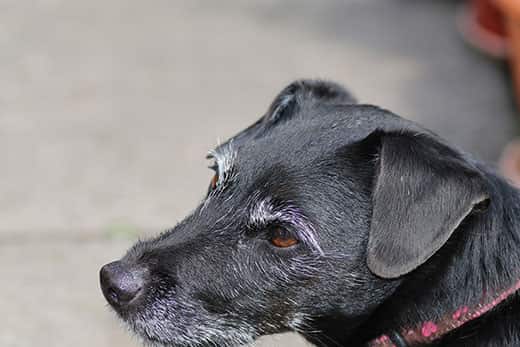


Tasty Tips
Senior Years
Typically, a graying muzzle or face is a sign your dog is entering his senior years. Typically, dogs enter their senior years between the ages of seven and ten, but depending on your dog's size it might be even younger. For instance, giant breed dogs (those that weight 91 pounds or more) can be considered senior by the time they turn five, according to the American Veterinary Medical Association (AVMA). Small and medium breeds (up to 50 pounds) can be considered a senior at around age seven. Genetics plays a large roll in the graying process of your dog as certain breeds or lineages have a predisposition for graying earlier than others. It's also a lot easier to notice a gray muzzle on a dog with darker hair than say a West Highland white terrier.
Dogs that have reached their senior years may benefit from switching to a senior dog food. While it doesn't reverse the causes of graying in your dog, the best senior formulated dog foods offer a nutritional formula that works to ease the effects of aging. For instance, Hill's® Science Diet® Youthful Vitality was developed with the changing biology of pets ages seven and above in mind. The breakthrough nutrition found in the Science Diet® food is made with Hill's proprietary recipe of natural ingredients including fruits, vegetables, fatty acids and antioxidants plus added vitamins, minerals and amino acids — all of which work together to fight the effects of aging. Its formula is designed to help with brain function, energy and vitality and healthy immune and digestive systems. It also includes essential fatty acids that promote a coat with increased shininess and softness.
Going gray — for whatever reason — might give your dog a new look. But he will still thrive on the same love and attention he's always wanted from you!


Kara Murphy is a freelance writer and pet parent who lives in Erie, Pa. She has a goldendoodle named Maddie.
Related products
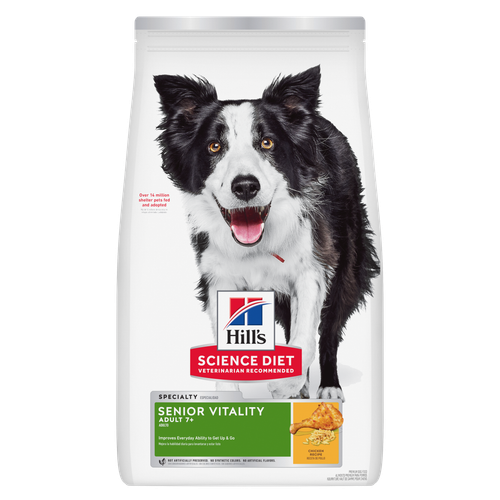
Improves Everyday Ability to Get Up & Go

Vital nutrients to support 5 essential building blocks for lifelong health

Vital nutrients to support 5 essential building blocks for lifelong health

Improves everyday ability to get up & go
Related articles

Learn how to stop your dog from begging at the dinner table, and understand how it can help contribute to his health.

Understand the role that Omega-6 and Omega-3 fatty acids play in your dog's overall health, and how you can ensure they are getting enough.
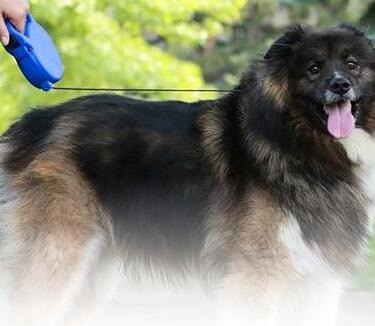
Discover fun and engaging games and other ways to help your dog exercise, keeping him happy and healthy.
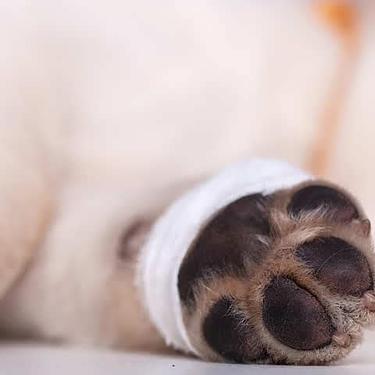
Learn basic steps & precautions for treating a cut on your dog, including what you can put on the cut, and when you should take them to the vet.

Put your dog on a diet without them knowing
Our low calorie formula helps you control your dog's weight. It's packed with high-quality protein for building lean muscles, and made with purposeful ingredients for a flavorful, nutritious meal. Clinically proven antioxidants, Vitamin C+E, help promote a healthy immune system.
Put your dog on a diet without them knowing
Our low calorie formula helps you control your dog's weight. It's packed with high-quality protein for building lean muscles, and made with purposeful ingredients for a flavorful, nutritious meal. Clinically proven antioxidants, Vitamin C+E, help promote a healthy immune system.

